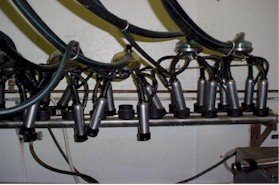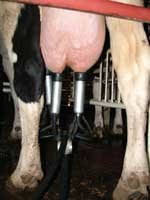|
BLAST
Dairy Cleaner Sanitizer
Multi-Purpose
Cleaner Sanitizer for the Dairy
Industry
CLEANS
* REMOVES MILKSTONES * MIXING IS EASY
* SANITIZES |
 |
$906.45
55 Gallon Drum |
 |
| $105.55
6 Gallon Pail |
| $536.80
30 Gallon Drum |
| $17.30
Gallon Bottle |
 |
DIRECTIONS FOR USE-
|
|
|
| It is a violation
of Federal Law to use this product in a manner inconsistent with its
labeling. Blast Dairy Cleaner is
easily and quickly dispersed in hot or cold eater and cleans in water up
to 1700ppm of hardness (as calcium carbonate) to form a completely uniform
solution. Blast Dairy Cleaner/Sanitizer
when used at a 1:500 aqueous dilution (200ppm active quaternary) may be
used on food processing and dairy equipment. |
| CLEANING
BULK MILK TANKS- |
|
| As
soon as possible after milk has been removed from bulk tanks, rinse tank
completely with cold water and allow to drain.
Place 4 gallons of warm water (120°F) in tank and add 1 ounce (2
tablespoons) Blast Dairy Cleaner to the water in the tank.
Scrub tank, mixers and covers and then allow to drain. |
| SANITIZING
MILK EQUIPMENT AND COW UDDERS- |
|
Previously
cleaned milking equipment, pails, inflations and tubing should be
sanitized prior to milking operations by preparing a 200ppm solution of
active quaternary by mixing 1 ounce (2 tablespoons) Blast Dairy Cleaner in
4 gallons of water.
Scrub or dip equipment into the solution for one minute and allow
to drain prior to the beginning of the milking operation.
Do not rinse equipment with water after treatment. Use a
clean single service towel for each animal to wipe udders with the above
sanitizing solution prior to milking.
Never reuse towel or dip used towel back into solution. Always use
freshly prepared solutions and non-corrodible utensils. |
| SANITIZING
DAIRY PRODUCT DISPENSING EQUIPMENT- |
| Previously
cleaned dairy product dispensing equipment should be sanitized by
preparing a 200ppm solution of active quaternaries by mixing 1 ounce Blast
Dairy Cleaner in 4 gallons of water.
Run this solution through the equipment for one minute and allow to
drain before use.
For removable parts, clean and dip in 200ppm solution.
Let them air dry.
To sanitize immobile items, flood them with a 200ppm active quat by
sponging or spraying for at least 60 seconds and let dry.
Do not rinse equipment with water after treatment. |
| HARD
WATER TOLERANCE- |
|
| This
product fulfills the criteria of Appendix F of the Grade A Pasteurized
Milk Ordinance
1965 recommendation of the U.S. Public Health Service in waters up to
600ppm of hardness calculated as calcium carbonate, when tested by the
AOAC Germicidal and Detergent/Sanitizing Official Method.
Consult you milk inspector or health officers for recommendations
on your local program.
|
| PRECAUTIONARY
STATEMENTS |
|
| Hazardous to humans
and domestic animals. Danger, Keep Out Of Reach Of Children.
Corrosive. Causes severe eye and skin damage. Do not get in
eyes, on skin, or on clothing. Wear goggles or face shield and
rubber gloves when handling. Harmful or fatal is swallowed.
Avoid contamination of food. Remove and wash contaminated clothing. |
| STATEMENT
OF PRACTICAL TREATMENT |
|
| In
case of contact, immediately flush eyes or skin with plenty of water for
at least 15 minutes.
For eyes, call a physician.
Remove and wash contaminated clothing before reuse.
If swallowed, drink promptly a large quantity of water.
Avoid alcohol.
Call a physician immediately. NOTE TO PHYSICIAN
Probable
mucous damage may contraindicate the use of gastric lavage |
| STORAGE
AND DISPOSAL |
|
| DO
NOT CONTAMINATE WATER, FOOD OR FEED BY STORAGE OR DISPOSAL. |
| STORAGE
Store in a dry place no lower in temperature than 50°F or higher than 120°F. |
| CONTAINER
DISPOSAL
Do not reuse empty container.
Triple rinse empty container with water.
Return metal drum then offer for reconditioning or puncture and
dispose of in a sanitary landfill, or by other procedures approved by
State and local authorities.
Plastic containers may be disposed of in a sanitary landfill,
incinerated, or if allowed by local authorities, by burning.
If burned stay out of smoke.
|
| PESTICIDE
DISPOSAL
Pesticide wastes are actually hazardous.
Improper disposal of excess pesticide, spray mixture, or rinsate is
a violation of Federal Law.
If these wastes cannot be disposed of by use according to label
instructions contact your State Pesticide or Environmental Control Agency,
or the Hazardous Waste representative at the nearest EPA Regional Office
for guidance. |
|
ACTIVE INGREDIENTS
n-Alkyl (60% C14, 30% C16,
5% C12,
5% C18) dimethyl
benzyl
ammonium chlorides.................
5.0%
n-Alkyl (68% C12, 32% C14)
dimethyl ethylbenzyl
ammonium chlorides.................
5.0%
INERT
INGREDIENTS......
90.0%
Total
100% |
EPA
REG. NO. 1839-51-50569
EPA
EST. NO. 50569-UT-01
|

